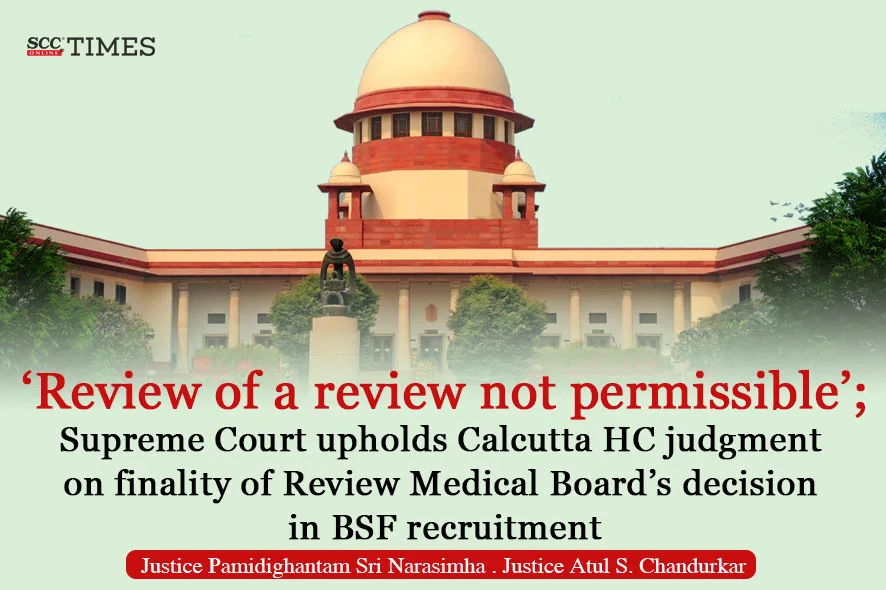Supreme Court: In a Special Leave Petition filed by the Union of India challenging the judgment of the Calcutta High Court, wherein it was held that the decision of the Review Medical Board in respect of the post of Head Constable (Ministerial) in the Border Security Force (‘BSF’) is final, and that no appeal or further medical examination can be entertained against its findings, the Hon’ble Supreme Court, comprising Pamidighantam Sri Narasimha and Atul S. Chandurkar, JJ. upheld the impugned judgment and declined to interfere, thereby affirming the legal position adopted by the High Court.
An advertisement dated 06-07-2015, was published by the BSF, notifying vacancies for various posts. Respondents 1 and 2 applied for the position of Head Constable (Ministerial).
As per the advertisement, the selection procedure consisted of two phases. Phase 1 comprised a written examination, while Phase 2 included physical measurements, a medical examination, document verification, and other physical tests. Both respondents successfully cleared the written examination and subsequently appeared for the medical examination.
The respondents submitted that the medical examination was governed by the Revised Uniform Guidelines for Recruitment Medical Examination for Recruitment of GOs and NGOs in the CAPFs & AR, dated 20-05-2015 (‘Impugned Guidelines’). According to these guidelines, candidates declared unfit during the initial medical examination were entitled to a Review Medical Examination if they chose to appeal.
It was also explicitly stated in the guidelines that there was ordinarily no right of appeal against the findings of the Recruiting Medical Officer or the Initial Medical Board. However, if the Government was satisfied, based on evidence submitted by the candidate of a possible error in the initial assessment, it could allow re-examination by a Review Medical Board. Therefore, under the rules set out in the guidelines, a review of the initial medical examination was to be permitted only in exceptional cases, and only upon a formal application by the aggrieved candidate.
The Madhya Pradesh High Court, in Writ Petition filed by Respondent 2, challenging the results of the medical tests, merely issued notice in the petition and did not issue any direction to the Petitioners to take action or grant any interim protection to Respondent 2.
Despite the absence of any such direction from the Court, the Petitioners suo motu proceeded to re-review the medical examination, which was clearly beyond the scope of the rules prescribed under the impugned guidelines.
Furthermore, the writ petition before the Madhya Pradesh High Court was dismissed as withdrawn, after the Petitioners submitted an affidavit before the Court stating that Respondent 2 herein, had been appointed to the post of Head Constable (Ministerial).
However, during the hearing of Writ Petition, the Single Judge of the Calcutta High Court inquired from the Petitioners whether there existed any provision permitting a second review medical examination after the Review Medical Board had rendered its findings. The Petitioners were unable to produce any rules or regulations to support such an action.
The respondents submitted that the power of review is not an inherent power. Such power must be conferred by law, either specifically or by necessary implication. No authority can assume this power unless it is explicitly provided by the relevant statute or rules. As is evident from the aforesaid guidelines, the power to review the findings of the Initial Medical Board lies solely with the Government, and even then, only upon an application made by the candidate highlighting errors in the initial findings. A Review Medical Examination may be conducted only when the candidate formally appeals against the initial medical examination result. In the case of respondent 2, a review medical examination was already conducted, and the candidate was declared unfit therein. The guidelines do not provide for any further review or appeal after the Review Medical Examination. However, in the instant case, the Government malafidely undertook another review suo motu, which is clearly beyond the scope of the applicable rules.
In view of the foregoing, the respondents argued that the action of the Petitioners in conducting another Review Medical Examination is clearly illegal, ultra vires, and without authority, and therefore, deserves to be set aside in its entirety.
The Single Judge and the Division Bench of Calcutta High Court arrived at a consistent conclusion that the decision of the Review Medical Board is final, and that no appeal or further examination can be entertained against its findings. Therefore, the opinion of the Review Medical Board is conclusive and not open to being reopened or revisited.
Furthermore, both the Single Judge and the Division Bench duly took note of the fact that the impugned guidelines do not contain any provision empowering the authorities to conduct a subsequent or fresh medical examination once the Review Medical Board has delivered its opinion. Thus, any such action initiated by the Petitioners was without authority, beyond jurisdiction, and contrary to the rules governing the selection process.
[Union of India v. Yogesh Chhetri, 2025 SCC OnLine SC 1469, decided on 15-07-2025]
Advocates who appeared in this case :
For Petitioner(s): Ms. Archana Pathak Dave, A.S.G., Mr. Praneet Pranav, Adv., Mr. Sandeep Singh, Adv., Mr. Merusagar Samantaray, Adv., Mr. Shashank Bajpai, Adv., Mr. Arvind Kumar Sharma, AOR
For Respondent(s): Mr. Swarnendu Chatterjee, AOR,Ms. Harshita Rawat, Adv., Mr. Sanjay Kumar Dubey, AOR,Ms. Shuchi Singh, Adv., Mr. Rakesh Kumar Tewari, Adv., Mr. Vivek Kumar Pandey, Adv. Ms. Shivani Mishra, Adv., Mr. Ujjwal Kumar Dubey, Adv., Mr. Devendra Kumar Mishra, Adv., Mr. Aman Kumar, Adv.







